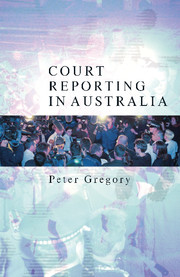Book contents
- Frontmatter
- Contents
- Figures and Tables
- Acknowledgments
- Introduction
- Chapter 1 The Court System: An Overview
- Chapter 2 Gaining Information
- Chapter 3 Contempt
- Chapter 4 Defamation
- Chapter 5 Writing the (Newspaper) Story
- Chapter 6 Subediting and Photography
- Chapter 7 Television and Radio
- Chapter 8 Human Relations and Ethics
- Chapter 9 An Atypical Friday at Court
- Chapter 10 Suppression Orders
- Chapter 11 Future Directions and Issues
- Bibliography
- Index
Chapter 8 - Human Relations and Ethics
Published online by Cambridge University Press: 22 September 2009
- Frontmatter
- Contents
- Figures and Tables
- Acknowledgments
- Introduction
- Chapter 1 The Court System: An Overview
- Chapter 2 Gaining Information
- Chapter 3 Contempt
- Chapter 4 Defamation
- Chapter 5 Writing the (Newspaper) Story
- Chapter 6 Subediting and Photography
- Chapter 7 Television and Radio
- Chapter 8 Human Relations and Ethics
- Chapter 9 An Atypical Friday at Court
- Chapter 10 Suppression Orders
- Chapter 11 Future Directions and Issues
- Bibliography
- Index
Summary
Trust and respect
A senior court reporter received a telephone call from an anonymous contact. He sat patiently listening to the caller describe a case in some detail and make suggestions about the qualities of the parties involved in the legal fight. After some minutes, he asked the caller: ‘And what's your interest in this?’ ‘I'm just an innocent bystander,’ was the reply. The journalist paused, then shot back: ‘I've been reporting courts for 20 years, and I haven't seen an innocent bystander yet.’
It might seem harsh to take a cynical view of information sources, but this journalist had a point. Everyone at the court has an interest or agenda. Reporters want stories, lawyers represent their clients, judges (we hope) make fair decisions that survive appeals. Callers or letter writers rarely tell you about a case for fun. They might be outraged at what they see as unfairness or sharp practice. An enemy may be in trouble, and the caller takes the chance to exact revenge. A public-spirited citizen may want to expose wrongdoing. It will not matter much if you find the case and hear the evidence for yourself, but a reasonable way of checking the veracity of a claim is to seek specific information. Ask for the location of the court, the name of the judge hearing the case or the charges being faced. Try to establish the name of lawyers involved.
- Type
- Chapter
- Information
- Court Reporting in Australia , pp. 123 - 143Publisher: Cambridge University PressPrint publication year: 2005



